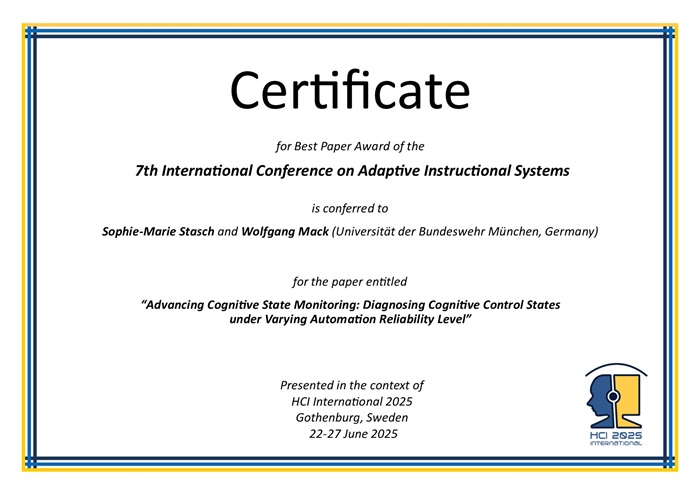The Best Paper Award of the 7th International Conference on Adaptive Instructional Systems
has been conferred to
Sophie-Marie Stasch, Wolfgang Mack, (Universität der Bundeswehr München, Germany)
for the paper entitled
"Advancing Cognitive State Monitoring: Diagnosing Cognitive Control States under Varying Automation Reliability Level"

Sophie-Marie Stasch
(presenter)

Best Paper Award for the 7th International Conference on Adaptive Instructional Systems, in the context of HCI International 2025, Gothenburg, Sweden, 22 - 27 June 2025

Certificate for Best Paper Award of the 7th International Conference on Adaptive Instructional Systems presented in the context of HCI International 2025, Gothenburg, Sweden, 22 - 27 June 2025
Paper Abstract
Accurate monitoring of a learner’s cognitive state is essential for adaptive instructional systems (AIS) to provide personalized support tailored to the learner’s current needs. Cognitive control plays a critical role in learning and multitasking, with two variants either enhancing the acquisition of new information and task switching (learning efficiency/cognitive flexibility) or supporting the efficient processing of information and shielding tasks from interference and distractions (processing efficiency/cognitive stability). Previous research has shown that eye-tracking metrics can diagnose the cognitive control mode (flexible or stable) in real-time using a binary classification approach. This study extends that finding by investigating whether cognitive control can also be classified under varying levels of automation reliability. Automation reliability is an important factor in human-machine performance, particularly in safety-critical systems, where training for responses to unreliable automation is essential for safety. Results demonstrate that eye-tracking metrics can classify cognitive control with an average accuracy of 0.80 and the automation status of a task with an accuracy of 0.89. These findings highlight the potential of eye-tracking as a tool for real-time assessment of learners’ cognitive control states. They also have important implications for AIS aimed at teaching attentional and meta-control strategies in multitasking environments. Finally, we discuss the implications of these findings and outline future research directions for AIS development.
The full paper is available through SpringerLink, provided that you have proper access rights.


